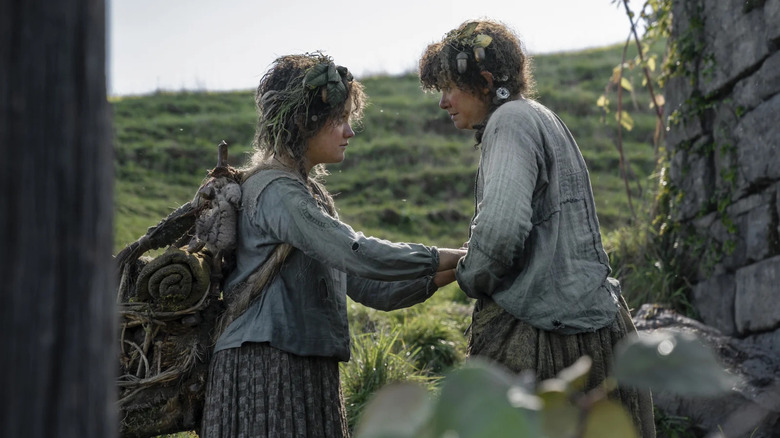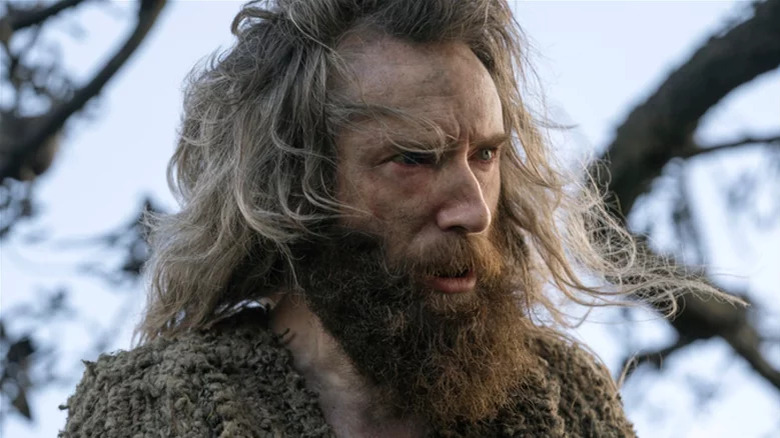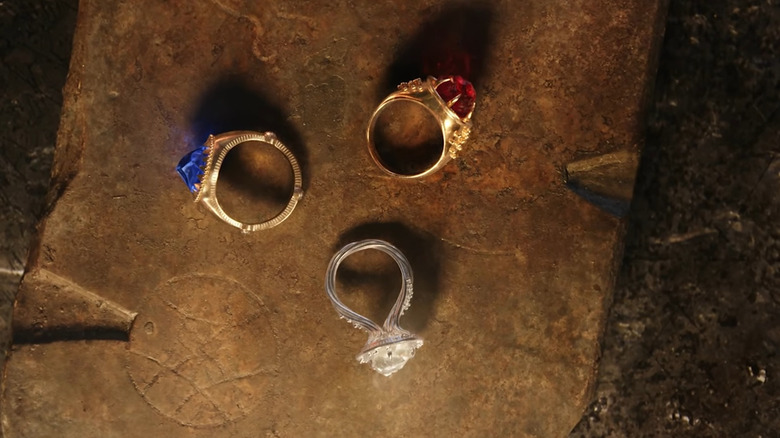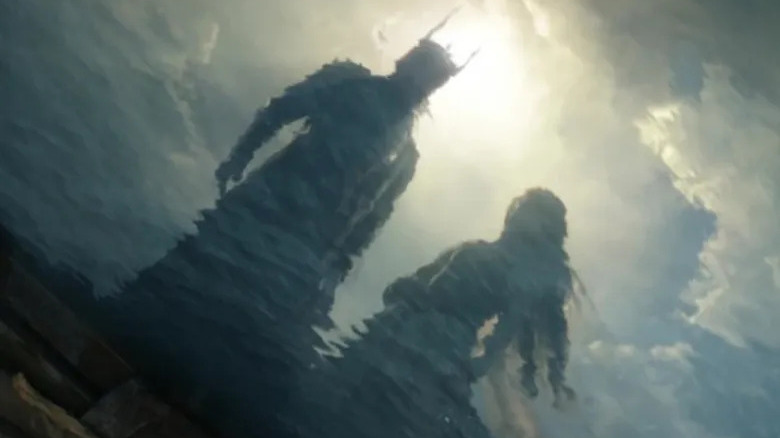The Lord Of The Rings: The Rings Of Power Season 1 Ending Explained: In The Darkness Bind Them
The Second Age is arguably the most eventful, sparse, and complicated age in Middle-earth. Where the First Age is full of rich history, myth, and stories that Tolkien started working on even before "The Lord of the Rings," which already chronicled most of the Third Age, the Second Age is full of contradictions and unfinished ideas. It makes sense, since professor Tolkien wrote and rewrote the history of Middle-earth over and over for most of his life, and left it unfinished by the time he died. Things like the origin of the orcs and the history of Sauron had many different versions, and Tolkien never fully settled on just one idea.
This is to say that "Rings of Power" had the impossible task of filling in the gaps of the story, while also reconciling with Tolkien's unfinished writing. The show resorted to remixing the source material, changing locations, characters and the timeline of events in order to tell a concise story. While some of these changes didn't work, a lot of it did, especially when you consider the gargantuan legendarium from which the show is adapted. The finale brought that to a head, as we finally get the titular Rings of Power, the monster that helped create it, and more.
A lot happened, and there's a lot we don't know. You have questions, we have some answers, so let's dive into "The Lord of the Rings: The Rings of Power" finale, "Alloyed." Spoilers ahead ... obviously.
'I am good'
The season finale of "Rings of Power" is all about the conflict of light and dark, and in true Tolkien fashion we get some victories, and many of devastating and tragic defeats.
Let's start with the biggest victory: that of Nori and The Stranger. This was one of the most frustrating storylines of the season, as the mystery box approach was very hit-or-miss regarding The Stranger, even if the performances and the story itself were great. When the episode starts, the mystics (those weird priests) tell The Stranger he is actually Sauron himself, and the surprise actually works. This is actually the most fascinating scene, and the coolest idea of the season, that this man we've seen all alone as he becomes friends with the harfoots is actually the Dark Lord of Mordor. Again, the idea of the conflict between light and darkness, as The Stranger refuses the idea that he is evil, but the mystics try to convince him otherwise.
Although Tolkien's writing tends to be criticized for being relatively simplistic in its morals — people are either good or bad — there is a lot of conflict in his writing too, and this episode perfectly captures that. The idea that Sauron, technically an angel made by an all good, all powerful god, could also be the kind old man who has helped the harfoots all season is very cool, and the show totally sells that maybe Sauron could grow to be a kind person with the right environment.
Of course, he is not Sauron, but one of the Istari, and most probably Gandalf given the many obvious hints the show drops. We will likely not hear the name Gandalf for a long while given the name given to him by the elves, it is very clear that's who he is, and it works.
Immortality in stone
Again, the idea that this creature chooses to be good because he's influenced by the selflessness he sees in Nori and the harfoots, and the idea that things could have gone differently, feels very Tolkien. And to make things better, it is all thanks to the seemingly insignificant halflings that one of the most powerful beings in Middle-earth became good.
Then we have Númenor, where darkness seems to be taking hold. We see the death of king Tar-Palantir, and the show following the lead of that other fantasy show in giving us a scene where a dying monarch leaves a cryptic message right before he dies that will wreak havoc in his kingdom. By the time Queen Miriel arrives, we see the entire city is covered in black banners signaling the death of the king. More importantly, however, is the seeds being planted for the fall of Númenor via Ar-Pharazôn, who seems genuinely distraught over the death of the king, and the fragility of men because of their short lifespans, saying the kind will have a tomb that shall grant him immortality in stone. This obsession with immortality is the driving force of Númenor, and will have severe consequences for the show going forward.
This is something we don't see in the movies, which instead show every single living being on Middle-earth having no faith in men, who have continued to fail in every age. "Rings of Power" is quickly teasing the fall of men and the beginning of their doom. Here, we get a big defeat against darkness, with the death of the king signaling a coming conflict that may spell the doom of Númenor.
Consider this ... a gift
The third main storyline of the episode also ends with a major victory for darkness, as we finally see the Dark Lord Sauron reveal himself as the human man Halbrand. Again, despite the rather obvious reveal and the frustrating and unnecessary mystery, this reveal worked like gangbusters. Charlie Vickers does a fantastic job pulling his own take on Christopher Reeve's Superman transformation, and his line about being awake "since before the breaking of the first silence" is straight up Tolkien.
The interesting part of this storyline, however, is the reveal of Sauron's redemption attempt arc. This is something that could seem corny at first glance, the idea that we are now so used to complex villains that even Sauron has to be quasi-redeemed. And yet, this is something that Tolkien himself thought of at some point, that after the defeat of Morgoth, Sauron legitimately repented for his crimes, most likely out of fear of suffering his master's punishment, but still! "Rings of Power" sells the idea that in Sauron's mind, he actually did repent, became good, and is trying to save the world from doom. He is choosing to do evil things because he thinks they are bad, but it is still his choice, and not some inherent trait he cannot escape from.
The idea of fate and destiny are prevalent in fantasy stories and hero's journeys, that we have no choice in the story laid ahead for us, and "Rings of Power" is doing a fantastic job countering that. Instead, we get a show that is all about choices, about the temptation to do evil, to seek power, and the attempts to combat that and do good instead. After all, whether he liked it or not, Sauron still did help the elves with the creation of the rings, so he is capable of SOME good.
'This shadow is but a small and passing thing'
This tracks with notorious Catholic J. R. R. Tolkien, who ardently believed in men's gift of free will, and whose greatest contribution to fantasy is arguably not his world building or epic story, but the fact that the hero of the story — Frodo — ultimately fails his task not because of some prophecy, but because he chooses to succumb to temptation.
The "Rings of Power" finale was all about light versus dark, a theme that will continue to be at the center of the show. The Second Age of Middle-earth is ultimately a huge tragedy, where things get progressively and infinitely worse and worse, until they finally start getting better. We're in for a lot of pain, but there are always people fighting back. Despite it all, at least we'll always have the harfoots and their majestic songs. As Bronwyn said in episode 6, "In the end, this shadow is but a small and passing thing. There is light and high beauty for ever beyond its reach."
"Rings of Power" season one is streaming on Prime Video.




